- Home
- Peter S. Beagle
A Dance for Emilia Page 2
A Dance for Emilia Read online
Page 2
I didn't know how to answer him; not because of what he had said, but because of the utter nakedness of his voice. He stared at me in silence for a long time, and then suddenly he looked away, the break so sharp that it felt physical, painful. He said, "Anyway, I'm too short."
I laughed. I remember that. "What are you talking about? Even I know ballet dancers can't be tall—Villella's practically a midget, for God's sake—"
"No, he's not. And he's strong as a horse; he can lift his partners all day and not break a sweat. I can't do that." All these years, and I can still see the absolute, unarguable shame in his face. "My upper body's never going to be strong enough to do what it has to do. And I look wrong onstage, Jake. My legs are stubby, they spoil the line. It is that bloody simple, and I'm very glad someone finally laid it out for me. Now all I have to do is figure out what exactly to do with the rest of my life."
He stood up and walked out of the Automat, and by the time I got outside, he was gone. We didn't see each other for the rest of the summer, although we talked on the phone a couple of times. By then, thanks to sending out ninety-four sets of resumes, I actually had a job waiting for me after graduation, building sets and doing walk-ons for a rep company in Seattle. Over the next five years I worked my way down to the Bay Area, by way of theaters in Eugene and Portland and stock jobs all over Northern California. I've been here in Avicenna ever since.
But we did stay in contact, Sam and I. I broke the ice, sending light postcards from the summer tours, and then a real letter from my first real address—South Parnell Street, that was. Two rooms and a ficus plant.
He didn't answer for some while, long enough that I began to believe he never would. But when it did come, the letter began with typical abruptness, asking whether I remembered The Body Snatcher, an old Val Lewton movie we'd loved and seen half a dozen times.
Remember that splendid, chilling moment when Karloff says through his teeth, "And I have done some things that I did not want to do..."? Me these last several years. I'll tell you the worst straight off, and leave the rest to your imagination. No, not the year spent teaching folk-dancing in Junior High School 80—much worse than that. I am become an Arts Cricket! Pray for me...
We'd been using Gully Jimson's term for a critic ever since reading The Horse's Mouth in high school. Sam's letter went on to say that he was writing regularly for a brand-new Manhattan arts magazine, now and then for a couple of upstate papers, and lately even filing occasional dispatches to Japan:
I mostly review music, sometimes theater, sometimes movies, if the first-stringer's off at Sundance or Cannes. No, Jake, I don't ever cover dance. I don't dare write about dance, because I couldn't possibly be fair to people who are up there doing what I want to do more than I want anything in the world. Music, yes. I can manage music...
We wrote, and sometimes called, for another three years before we met again. I hope my letters weren't as full of myself as I'm sure they were: entirely concerned with what plays I'd auditioned for, what roles I should have gotten, what actors I scorned or admired; what celebrated director had seemed very impressed but never called back. Sam, on the other hand, recounted the astonishing success of Ceilidh, the new magazine, described every editor and photographer he worked with; detailed, with solemn hilarity, the kind of performance he was most often sent to cover. "Most of them are so far avant that they lap the field and become the derriere-garde. Try to imagine the Three Stooges on downers."
But of his own feelings and dreams, of his world beyond work, of how he lived without dancing—nothing, not ever. And there we left it until I came to New York for a smallish part in a goodish play that survived barely a month. It was to be my Broadway break, that one—to be in it I turned down a tv movie, which later spun off into a syndicated series that's probably still running somewhere. I have an infallible gift for picking the losing side.
I never regretted the gamble, though, for I stayed with Sam during our brief run. He had found a studio apartment in the West Seventies, half a block off Columbus: one huge, high room, a vestigial kitchen nook, a bathroom, a deep and sinister coat closet that Sam called "The Dark Continent," a solid wall of books, the two biggest stereo speakers I'd ever seen, and a mattress in a far corner. I slept on the floor by the stereo that month, in a tangle of quilts from his Brooklyn bedroom. It was the first time we'd ever spent together as adults, with jobs to go to instead of classes. We kept completely different hours, what with me being at the theater six nights and two afternoons a week, while Sam put in five full days at the magazine, and was likely to be off covering a performance in the evenings. Yet we bumbled along so comfortably that I can't recall a cross word between us—only an evening when something changed.
At the time I was skidding into my first marriage, a head-on collision, born of mutual misunderstandings, with the woman who was lighting the play. On the windy, rainy evening that the closing notice was posted, she and I had a fight about nothing, and I sulked my way back to Sam's place to find him practicing a Bach sarabande on his classical guitar. He wasn't very good, and he wouldn't ever be good, no matter how dutifully he worked at it, and to my shame I said so that night. "Give it up, Sam. You haven't made a dent in that poor Bach in all the time I've been here. Guitar's just not your instrument—it's like me and directing. I can't even get three people lined up properly for a photograph. It's not the end of the world."
Sam didn't pay the least bit of attention to me. When the sarabande finally lurched to a close, he said, "Jake, I don't have any illusions about the way I play. But I don't think anyone should write about music who doesn't have at least some idea of what it takes to make your fingers pull one clear note out of an instrument. Out of yourself."
"The guitar you keep hacking at. The thing you could do, you quit. Right." I can still hear the pure damn meanness in my voice.
Sam put the guitar away and began rummaging in the refrigerator for a couple of beers. His back was to me when he said, "Yes, well, I did have some illusions about my dancing." He hadn't used the word all during my visit. "But that's what they were, Jake, illusions, and I'm glad I understood that when I did. I haven't lost any sleep over them in ... what? Years."
"You were good," I said. "You were terrific." Sam didn't turn or answer. Completely out of character, out of control, I kept pushing. "Ever wish you hadn't quit?"
"I still dance." For the first time since that long-ago lunch in the Automat, the voice was raw Brooklyn again, but much lower, a harsh mumble. "I take classes, I keep in shape." He did turn to face me then, and now there was anger in his eyes. "And no, Jake, I don't wish a damn thing. I'm just grateful that I had the sense to know what to stop wishing for. I didn't quit, I let go. There's a difference."
"Is there?"
What possessed me? What made me bait him, invade him so? The failure of the play, premonitions about my Lady of the Follow Spots? I have no more idea now than I did then. I said, "I've envied you half my life, you know that? You were born to be a dancer—born—and I've had to work my butt off just to be the journeyman I am." The words chewed their way out of me. "Sam, see, by now I know I'm never going to be anything more than pretty good. Professional, I'll settle for that. But you ... you walked away from it, from your gift. I was so furious at you for doing that. I guess I still am. I really still am."
"That's your business," Sam said. His voice had gotten very quiet. "My loss is my loss, you don't get to deal yourself in. Sorry." He said it carefully, word by word, each one a branding iron. "I have enough trouble with my own dreams without living yours."
"What dreams?" I asked. He should have hit me then—not for the two words, but for the way I said them. I can still hear myself today, now, as I write this, and I am still ashamed.
But Sam smiled at me. Whatever else I manage to forget about my behavior that night, I'll always remember that he smiled. He said, "Anyway, you're a bloody good actor. You're much better than a journeyman." And he handed me a bottle of beer, and suddenly we were tal
king about my career, about me again. We weren't to have another moment that intense, that intimate, for a very long time.
Over the years I came east more often than he came west, unless he had a Seattle Opera Ring to cover, or a Los Angeles symphony conductor to interview. He published three books: one on a year spent with the musicians of the Lincoln Center orchestra, one on Lou Harrison, and one—my favorite—about Verdi's last four operas. They got fine reviews and neither sold nor stayed in print. But the studio apartment was rent-controlled, and Ceilidh flourished, to its own considerable surprise. Occasionally they were even able to send Sam abroad, to cover music festivals in England or Italy. He visited his parents—long retired in Fort Lauderdale—four times a year, had another floor-to-ceiling bookcase installed, and got a cat.
About the cat. It was an Abyssinian female, almost maroon in color, and even as a kitten she had the slouchy preen of a high-fashion model. Sam named her Millamant, after Congreve's wicked heroine. Because both of the women I married had been cat-lovers, Sam appointed me his feline expert, and called me almost every day during the first weeks of Millamant's residency. "She just sits in her litter box and stares—is that normal?" "She keeps catching moths in The Dark Continent—should I make her stop?" "Jake, I took her for her shots, and now she's mad at me. How long do cats stay mad?" "Is it all right for her to eat pizza?" Millamant grew up to look like a miniature mountain lion, the reigning grande horizontale of the studio, and whenever I slept on the floor, she honored me with her favors. Usually at three in the morning.
As for myself, I peaked early. Right or wrong about Sam's talent, I was bang on the money about my own. I've never worked in New York again, unless you count summer stock in Utica, and there have been stretches when a voiceover, a tv cameo, or residuals from a soap-opera guest shot were all that kept a roof over my head. It's mostly theater, especially the Pacific Rep, that pays the bills; but the only long-running stage gig I have ever had was as a villain in a camp 1890s melodrama, which inexplicably ran for five years at a tiny San Francisco theater. It coincided almost exactly with my second marriage; they closed in the same week. That one's a director, and she's good. I think she's off doing Sweet Bird of Youth in China right now.
All the same, for good or ill, I'm still doing what I'm fit for and living as I always wanted to live—just not quite as well as I'd imagined—and Sam wasn't. That was a wider gap by far than the continent that separated us, but we never again talked about it. Everything else, yes, on weekends, when the rates were down—everything else from politics, literature, and the general nature of the universe to shortstops and whether Oscar Aleman could really have been as good a guitarist as Django. We went along like that until Marianne.
No, we went along like that until after Marianne. After she'd moved in with him, and after she'd left him two months and five days later for a playwright who'd written a one-woman show about Duse for her. I borrowed plane fare to New York because of the way he sounded on the phone. He was fine all the way through the nice dinner at the deli, and fine through the usual amble along Columbus, twenty blocks or so down, twenty blocks back. It wasn't until we were in the apartment, until I'd found a hairbrush of Marianne's and casually asked him where I should put it, that he came apart. I held him awkwardly while he cried, and Millamant came down from the bookshelf where she generally lived to sniff at his tears and butt her hard round head against his chin. It was a very long night, and I don't know whether I did or said anything right or anything wrong for him. I was just with him, that's all.
He came to Avicenna more often after that, always spending at least a weekend, sleeping on a futon, content with my books and record albums if I was in rehearsal; ready for a walk on balmy evenings—he never quite lost the unmistakable near-waddle of the ballet dancer—equally easy with silences long grown as comfortable as the lazily circular arguments that might go on until one of us dozed off. I recall asking one midnight, during his last visit, "Do you remember what your dad used to say, every time he heard us discussing something or other?"
Sam laughed in the darkness. " 'Those two, they're a couple of alte kockers already! Old men sitting in the park, squabbling about Tennessee Williams and Mickey Mantle.' Fifteen, sixteen, and he had us pegged."
I remember everything about that visit, when he holed up in my house for a full week, trying so determinedly to quit smoking. The walks got longer, to keep his mind off cigarettes; he managed quite well during the daytime, but the nights were hard, as I could tell from the smell in the bathroom most mornings. Even so, he cut down steadily until, a couple of days before he left, he got by on two half-smoked cigarettes, and we went out to my favorite Caribbean restaurant to celebrate. He had the jerk chicken and I had the ropa vieja.
There's an unmarked alley not far from my house that leads to a freeway overpass, and from there into a children's park as dainty and miniature as a scene in one of those gilded Victorian eggs. We walked there after dinner, talking obliquely of Marianne, for the first time in a long while, and of my ex-wives. It was when we stopped to drink at a child-size fountain that Sam said, "You know, when you think about it, you and I have been involved with a remarkable number of highly improbable women. I mean, for just two people."
"We could start a museum," I suggested. "The Museum of Truly Weird Relationships." That set us off. We walked round and round for hours, opening up the one aspect of our lives kept almost entirely private for all the years of our friendship. The public defender, the bookstore owner, the poet, the set designer, the truck mechanic—it doesn't matter which of us was embrangled with whom; only that the romances almost invariably ended as comedies of errors, leaving us to lick our wounds and shrug, and present our debacles to each other like wry trophies. We laughed and snorted, and said, "What?" and "Oh, you're kidding" and "You never said a word about that—that's a whole wing of the museum just by itself," until the children and their parents were all gone home, and we were the only two voices in the little park. It was just then that Sam told me about Emilia.
"She's too young," he said. "She is twenty-six-and-a-half years younger than I am, and she's from Metuchen, New Jersey, and she's not Jewish, and if you say either bimbo or bunnyrabbit, Jake, I will punch you right in the eye. I shouldn't have mentioned her, anyway. I don't think this one belongs in the Museum at all."
"Hoo-ha," I said. He looked at me, and I said, "Sorry, sorry, hoo-ha withdrawn—it's just I've never heard you sound like that. So. Would you maybe marry this one?"
"You're the chap who marries people. If I were the sort who gets married, I'd be married by now." He fell silent, and we walked on until we came to the swings and the sliding pond and the monkey bars. We sat down on the swings, pushing ourselves idly in small circles, letting our shoes scrape the ground. Sam said, "Emilia covers New York for a paper in Bergen County—that's how I met her, about a year ago. She takes the bus in on weekends."
"A journalist, yet. Not a cricket?"
"Good night, no, a real writer. If there were any real newspapers left, she'd have a real career ahead of her. I keep telling her to get into tv, but she hates it—she won't even watch the News Hour." He pushed off harder, gripping the chains of the swing and leaning back. "The whole thing's crazy, Jake, but it's not weird. It's just crazy." He looked over his shoulder at me and grinned suddenly. "But Millamant likes her."
"I'm jealous," I said, and I actually was, a little. Millamant doesn't like a lot of people. "She stays the weekend? And it works out?"
He was a heavy sleeper, and you had to be really careful about waking him, because he always came up fighting. I never knew why that was. Sam laughed then. "On top of everything, she's an insomniac. Only person I ever gave full permission to wake me up at any time. It works out."
"Hoo-ha. So she'll be moving in?"
Sam didn't answer for a long time. We swung together in the darkness, with no sound but the slow creak of the chains. Finally he said, "I don't think so. I think maybe I lost my nerve with Marianne."
I started to say something, and then I didn't. Chains, owls, a few fireflies, the distant mumbling of the freeway. Sam said, "I couldn't go through that again. And it will happen again, Jake. Not for the same reasons, but it will."
"You don't know that," I said. "It works out sometimes, living with somebody. Not for me—I mean, both my marriages were absolute train wrecks—but there were good times even so, and they really might have worked. If I'd been different, or Elly had, or Suzette had. Anyway, it was worth it, pretty much. I wouldn't have missed it, I don't think."
"That," Sam said, pausing as precisely as our old hero Noel Coward would have done, "is the most inspirational tribute to the married state I've ever heard. You ought to crochet it into a sampler." He dropped lightly off the swing, and we went on walking, angling back the way we had come. Neither of us spoke again until we were on the overpass, looking down at the lights plunging toward the East Bay hills. Sam said, "She's not moving in. Millamant doesn't like her that much. But I want you to meet her, next time you come to New York. This one I want you to meet." I said I'd love to, and we walked on home.
At the airport, two nights later, we hugged each other, and I said, "Catch you next time, Jake." I don't remember when we started doing that at goodbyes, trading names.
"Next time, Sam. I'll call when I get home." He picked up his garment bag and started for the gate; then turned to flash me that fleeting grin out of childhood once more. "Keep a pedestal vacant in the Museum. You never know." And he was gone.
Marianne had Millamant, as it turned out when I made my way from JFK to her East Side townhouse. The Abyssinian met me at the door and immediately sprang to my shoulder, as she had always done whenever I arrived. Arthritis had set its teeth in her right hind leg since we last met, and it took her three tries, equally painful for us both. I tried to remove her, but Millamant wasn't having any. She dug her claws in even deeper, making a curious shrill sound I'd never heard from her before, and constantly pushing her head against my face. Her eyes were wide and mad. "He's not with me," I said. "I'm sorry, cat. I don't know where he's gone."

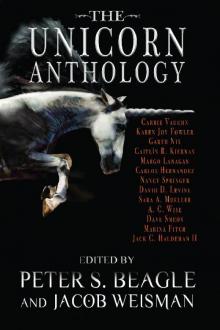 The Unicorn Anthology.indb
The Unicorn Anthology.indb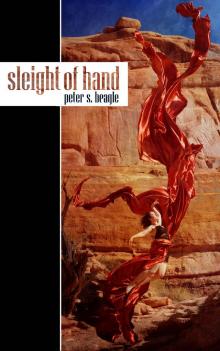 Sleight of Hand
Sleight of Hand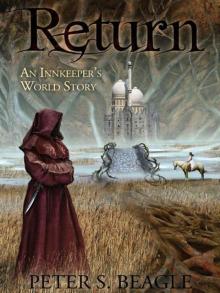 Return
Return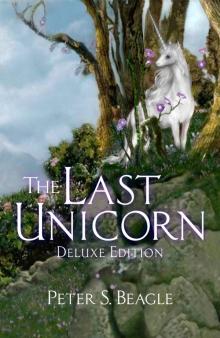 The Last Unicorn
The Last Unicorn Two Hearts
Two Hearts Mirror Kingdoms: The Best of Peter S. Beagle
Mirror Kingdoms: The Best of Peter S. Beagle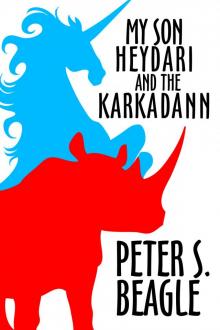 My Son Heydari and the Karkadann
My Son Heydari and the Karkadann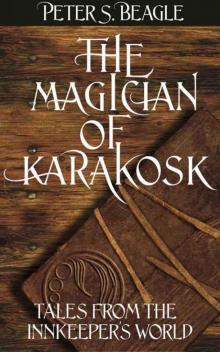 The Magician of Karakosk, and Other Stories
The Magician of Karakosk, and Other Stories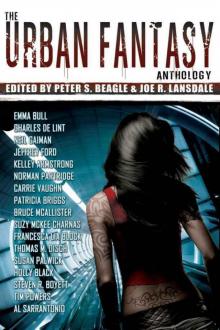 The Urban Fantasy Anthology
The Urban Fantasy Anthology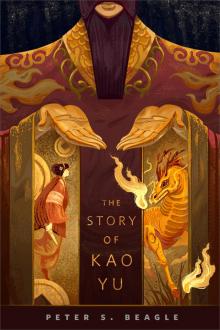 The Story of Kao Yu
The Story of Kao Yu The Karkadann Triangle
The Karkadann Triangle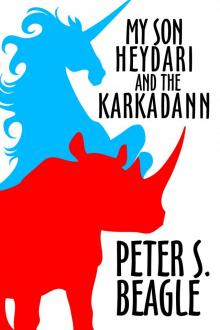 My Son and the Karkadann
My Son and the Karkadann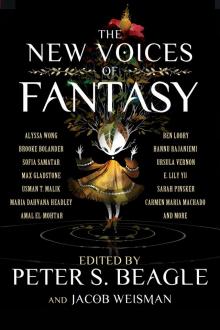 The New Voices of Fantasy
The New Voices of Fantasy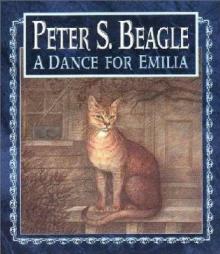 A Dance for Emilia
A Dance for Emilia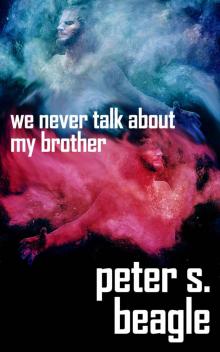 We Never Talk About My Brother
We Never Talk About My Brother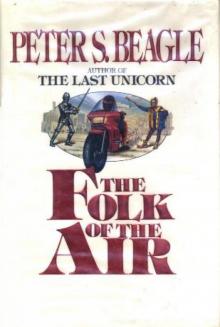 The Folk Of The Air
The Folk Of The Air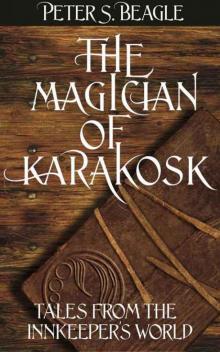 The Magician of Karakosk: Tales from the Innkeeper's World
The Magician of Karakosk: Tales from the Innkeeper's World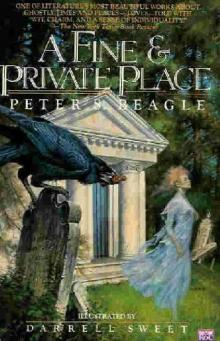 A Fine and Private Place
A Fine and Private Place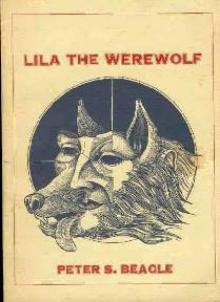 Lila The Werewolf
Lila The Werewolf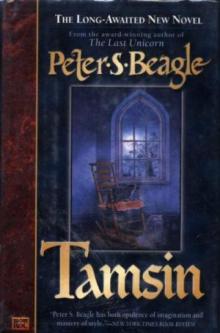 Tamsin
Tamsin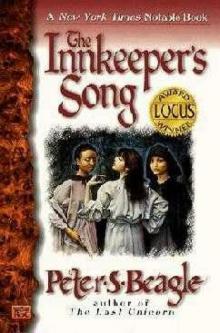 Innkeeper's Song
Innkeeper's Song